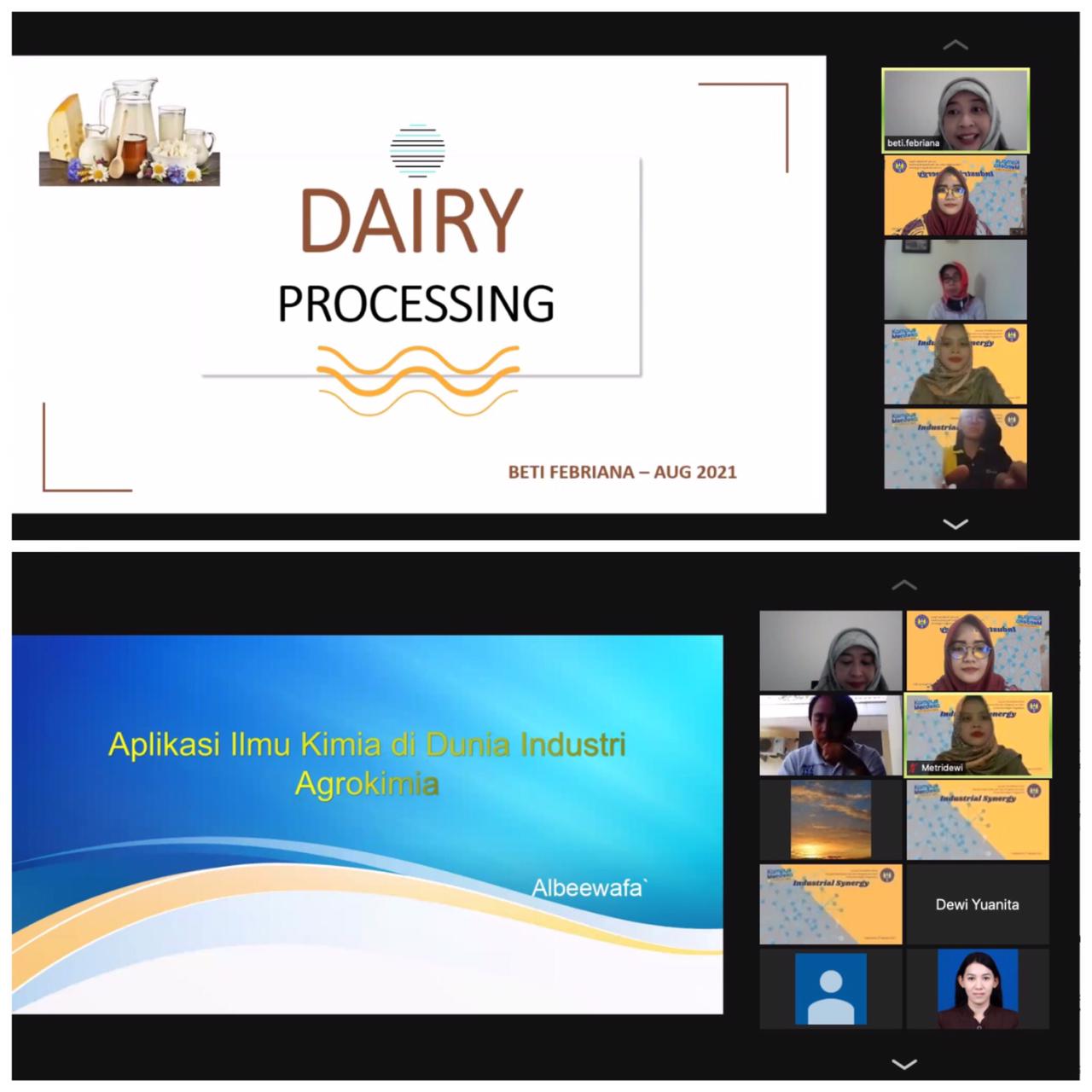You are here
Industrial Synergy: Applications of Chemistry in the Industrial World

Chemistry Study Program, Faculty of Mathematics and Natural Sciences, Yogyakarta State University carried out Industrial Synergy activities as one of the agenda in the Merdeka Campus Competition Program. This Industrial Synergy activity was carried out on Saturday, August 7, 2021 with the theme Application of Chemistry in Industry with two invited speakers, Beti Febriana Lestari, S.TP. and Albeewafa', S.Si.
Beti Febriana Lestari, S.TP. is a practitioner of PT. Indolakto who has more than 20 years of experience in the industry. In her presentation, Mrs. Beti explained about Dairy Processing by starting that milk must be consumed immediately until it runs out, after that it was found that when milk was heated to a certain temperature it was found to be more durable which later became the initiation of the pasteurization process of milk. He also emphasized that basically milk is perishable so it requires a preservation process. Some of the ways that can be done to preserve milk include the following.
- Set the temperature. In order to prevent bacterial growth, dairy products must be heated through a pasteurization process. Pasteurization process can only kill pathogenic bacteria. The pasteurized milk must be stored in the refrigerator and can only survive at a temperature of 4 degrees Celsius.
- ESL (Extended Safe Light) which makes the milk consumption period tend to be longer up to a month.
- Ultra-High Temperature (UHT) with milk yields can be stored for more than 7 months. Heating milk with the UHT process is carried out at a temperature of more than 140 degrees Celsius with a short time of about 4 seconds. However, because it is heated at a very high temperature, the nutrients contained in UHT milk are not as good and fresh as milk produced from the pasteurization process.
- Milk stored in containers with a heating process with a relatively lower temperature than UHT milk, which is around 114-120 degrees Celsius.
In addition to controlling temperature, other ways to preserve milk are: (1) adding sugar as in sweetened condensed milk, (2) controlling humidity as is often found in powdered milk, (3) regulating osmotic pressure, (4) and controlling water content and pH as in yogurt drinks. Mrs. Beti also said that basically there is no milk with the best nutrition because the best milk is milk that is adapted to the condition of the consumer's body. The graduates from the Chemistry study program are very likely to work and join the Dairy Milk industry, especially in the laboratory section to make new findings in order to make the industry more efficient and accurate.
On the other hand, Albeewafa', S.Si. who is the supervisor of the quality control process for incoming and outgoing plastic materials conveyed about the application of chemical science in the world of the agrochemical industry. The agrochemical industry is a very broad field and is concerned with the production and distribution of pesticides. He emphasized that the application of chemistry in the agrochemical industry can play a role as follows.
- RnD. Responsible for conducting research and development activities carried out with the aim of developing a new product or improving an existing product in order to obtain the largest possible profit with the smallest possible cost (developing or creating a formula). The reasons for a product in the industry must have a formulation: (a) the price of the active ingredient is very expensive, (b) the pure active ingredient is very toxic and dangerous, (c) the pure active ingredient is generally difficult to use in practice in the field.
- Quality Control which is divided into three parts: (a) incoming material QC (checking the quality of raw materials to produce products), (b) process and analysis (maintaining the quality of the production process, (c) out going (ensure the products sent are ok). Two key points that must be considered if working as a QC is accuracy and thoroughness.
- Marketing Support. Marketing support as the spearhead of the company that determines the company's progress in the future because it knows market tastes and provides counseling and training related to the agrochemical industry.
Through the implementation of industrial synergy today, it is hoped that it will provide a practical overview of how to work in the industry. Therefore, all universities must always review and update the curriculum of their study programs so that they can adapt to the skills that are really needed in the industrial world.
Sistem Informasi
Kontak Kami
Program Studi Kimia
FMIPA Universitas Negeri Yogyakarta
Kampus Karangmalang Yogyakarta 55281
Telp. (0274)586168 Pes. 115
Email: kimia@uny.ac.id atau s1kimia@uny.ac.id
Copyright © 2026,
